Spring is the best-value time to explore Iceland View Deals
Reynisfjara beach is the most famous black sand beach in Iceland. Tucked along the South Coast, this cinematic location is known for its ash-colored shores, towering basalt columns, and powerful sneaker waves crashing against the cliffs. Its otherworldly appearance and dramatic atmosphere have become a favorite backdrop for fantasy films and series, such as Game of Thrones.
A haven for birdwatchers and photographers, Reynisfjara is where wild forces take control—where the roaring Atlantic Ocean meets the volcanic history shaping the island. It’s a must-visit destination that captures the very essence of Icelandic nature.
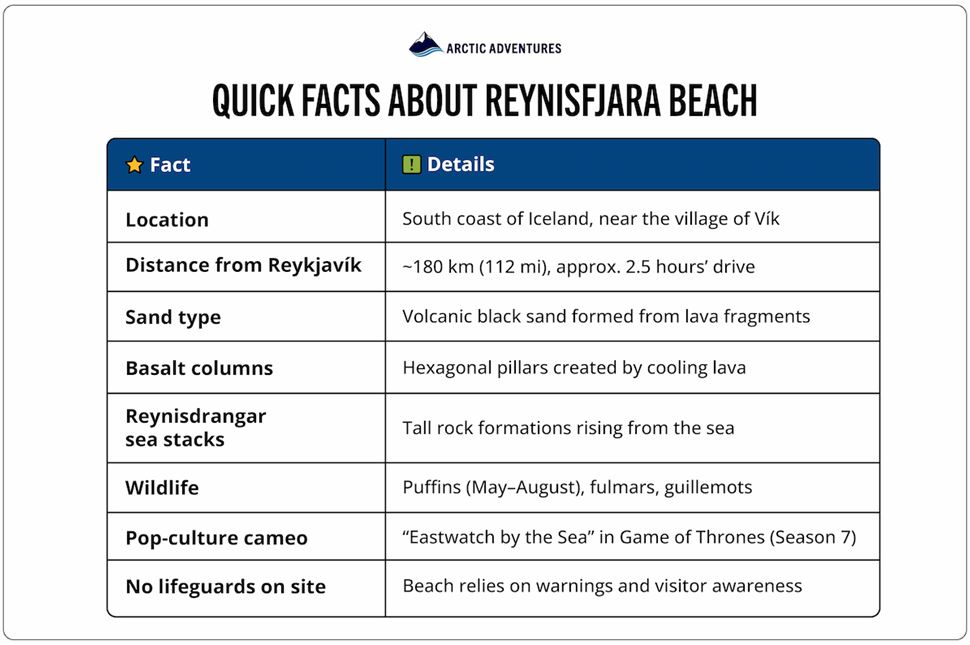
Quick facts about Reynisfjara beach. Source: Arctic Adventures.
Nominated as one of the world’s most iconic beaches and shorelines by National Geographic in 2025, Reynisfjara isn’t about cocktails and sunbathing.
The first thing that catches your eye is the midnight-hued sand, composed of volcanic ash and minerals. It's created when hardened lava rocks erode into tiny fragments, giving the shore its signature color. Due to the specifics of such formation, black sand beaches are much rarer than their white or golden siblings. Reynisfjara is a bold reminder of Iceland’s fiery volcanic history.
Another unique feature of Reynisfjara black sand beach is the tall basalt formations on and off the shore—a result of natural erosion sculpting the coastline over thousands of years. Steeped in legends, these cliffs are home to various species of Icelandic birds nesting on the South Coast from May to August.
Surrounded by numerous natural gems, Reynisfjara is the perfect gateway to other South Iceland attractions. After exploring this volcanic beach, you can reach the nearby village of Vík, Skógafoss and Seljalandsfoss falls, Fjaðrárgljúfur canyon—all within about an hour’s drive.
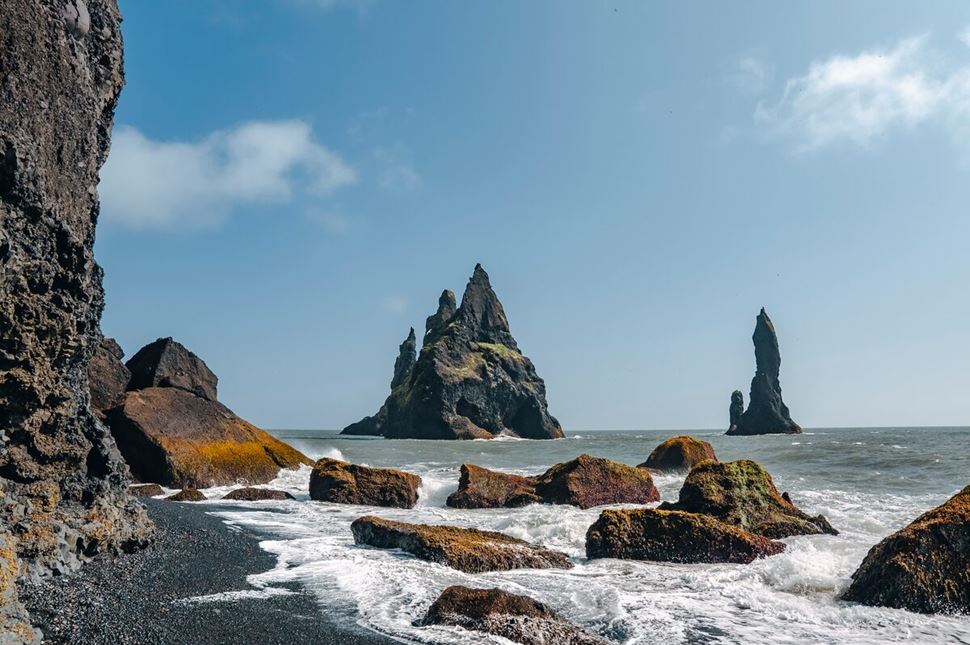
Majestic sea stacks rise above the foaming waters of Reynisfjara. Captured by Gunnar Gaukur.
From strolling along the black shores to snapping dramatic photos and birdwatching, there are many things to do at Reynisfjara. Spot playful puffins in summer or get a glimpse of the Northern Lights in winter. Discover filming locations from Game of Thrones, find hidden gems nearby, and spend the night in scenic spots before exploring neighboring attractions. Decide which Reynisfjara activities are a must-do for your upcoming trip:
1. Exploring Basalt Columns:
As soon as you set foot on the beach, your eyes will be drawn to the extraordinary Reynisfjara beach basalt columns rising from the shore. These massive hexagonal cliffs, appearing as if sculpted by giants, are one of Iceland’s natural artworks, formed by the rapid cooling of flowing lava. You can walk up to them and take pictures, but don’t try to climb up for your safety and respect for the site. While these towering columns are found on land, another unique phenomenon, Reynisdrangar basalt cliffs, lies just offshore, adding an extra layer of mystique.
2. Admiring Reynisdrangar Sea Stacks Offshore:
Icelandic legends say that the striking silhouettes of Reynisdrangar cliffs are the remains of two trolls who were dragging a three-masted ship toward shore. When daylight broke, the creatures were turned into stone. The vessel was trapped with them for eternity, forming a group of pillars now known as the Reynisdrangar Rocks.
In truth, these dramatic sea stacks were part of, and connected to, the Reynisfjall mountain range during the last ice age. Over thousands of years, relentless waves and harsh weather gradually separated the cliffs from the mainland. Today, they rise from the ocean like ancient sculptures—an exhibition you can safely admire from land.
Photography: There’s no better muse for photography than raw, untouched nature. Whether you’re a professional or just looking to snap some Instagram-worthy shots, Reynisfjara is a place your camera lens will fall in love with.
Powerful Atlantic waves crashing against the sea stacks, moody skies, and ink-colored sands make this basalt beach one of the best Iceland photography locations. For the perfect shot, come early in the morning—when the fog wraps around the cliffs and the only footprints in the sand are your own.
3. Birdwatching (Seasonal):
Those visiting in the summer months might witness Reynisfjara coming alive with the joyful sounds of fluttering wings. From May to August, Reynisfjall cliffs become a popular vantage point for birdwatching in Iceland. While the beach itself isn’t a direct nesting site, it’s one of the country’s best spots for seasonal puffin sightings. An entire colony of these playful seabirds flocks to this peaceful stretch of coast, circling the sea stacks and perching on the surrounding rocks. You can best observe them and other wildlife in the early morning or late evening hours.
4. Strolling the Black Sand (Seasonal):
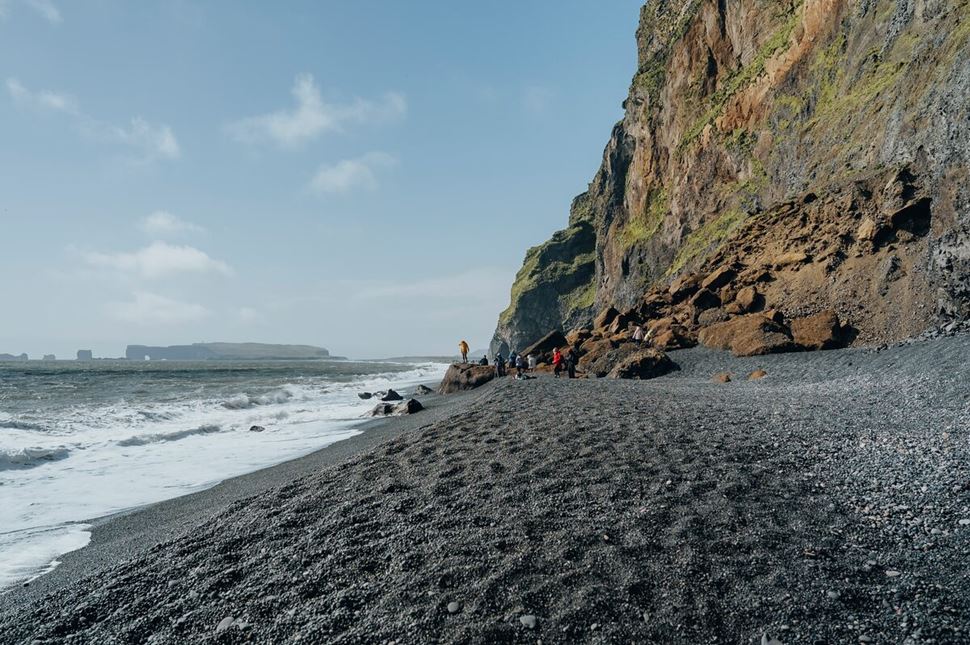
Watch out for sneaker waves at Reynisfjara and keep your distance from the water. Source: Arctic Adventures.
Standing on Reynisfjara feels like stepping into a natural amphitheater, where crashing Atlantic waves and towering basalt pillars leave you silently soaking in the moment. In any season and light, it reveals the powerful forces that rule this volcanic kingdom. Walking along the black pebble beach in Iceland makes you feel small and in awe of nature’s grandeur.
Feel the grainy sand slip through your fingers, get close to the on-land basalt formations, and observe the sea stacks from afar. Marvel at the force of the ocean, but keep your distance—sneaker waves are powerful and can be dangerous.
5. Viewing the Cliffs: There are several viewpoints at Reynisfjara overlooking the beach, basalt sea stacks, and the surrounding cliffs. The Reynisfjall hike to the west provides scenic vistas of the Reynisdrangar pillars. It involves hiking up a steep mountain path, so be sure to prepare and exercise caution on the slippery stones.
The eastern vantage point is on the Dyrhólaey peninsula. You can reach it from Vík í Mýrdal after a 20-minute drive. Offering panoramic views, it’s excellent for taking Reynisfjara black sand beach photos and watching puffins in summer.
6. Visiting Caves: Within the mountain Reynisfjall, which towers high above the black sand beach, you’ll find a hidden gem—a shallow Reynisfjara Cave, called Halsanefshellir. The entrance is framed with basalt columns. You can explore it from the inside, but only during low tide and calm ocean conditions. The cave was formed by sneaker waves crashing against the mountain. Over time, the water has carved the volcanic rock, creating a mesmerizing opening with enchanting rock formations inside. Reynisfjara beach cave is believed to have been used as a shelter by fishermen over the centuries, protecting them from challenging weather conditions.
7. Touring the Game of Thrones Location: For devoted Game of Thrones fans, Reynisfjara is a place where you can relive favorite scenes from the series in real life. On the show, the beach represents Eastwatch by the Sea because of its mysterious aura and oceanfront location. Feel like the main character when walking on these black pebble sands and hearing thundering waves breaking on the shore.
If you want to visit more places from the world-renowned series, book an exclusive tour of Game of Thrones in Iceland. See the Arrowhead Mountain, filmed at the Kirkjufell Mountain, explore the frigid area of Beyond the Wall, represented by Svínafellsjökull Glacier, and other significant spots.
The Reynisfjara Beach location is approximately 180 km (112 mi) from the capital. To get from Reykjavik to Reynisfjara, follow the paved Ring Road counterclockwise for about 2.5 hours in the direction of the village of Vík. Route 1 is generally in good condition year-round, but navigating in winter can be more challenging due to heavy snowfall. The drive from Vik to Reynisfjara takes only 12 minutes.
If you're coming from the east, near the village of Höfn, the journey to this black gem takes around 3.5 hours. And if you’re starting from Akureyri in the north, plan for a 6-hour drive. Once you’re on the South Coast, you can detour to other attractions such as Skógafoss and Seljalandsfoss waterfalls, Fjaðrárgljúfur canyon, or Katla volcano.
The easiest way to reach Reynisfjara is by car—either driving yourself or joining a guided tour bus if you'd prefer to sit back and enjoy the views. For more flexibility without the hassle of planning, you can book a self-driving package around Iceland. It leads you to Reynisfjara and other highlights, with maps and all key stops included.
If you want to experience a calmer ocean and spot wildlife, summer is the best season for visiting Icelandic beaches. Mild weather allows for longer exploration, but popular sites can become quite busy.
Most of Iceland's beaches—including Reynisfjara—are accessible year-round, so you can explore their dramatic beauty even in winter. During the frosty season, the black sand beach of Reynisfjara and other coastlines appear otherworldly, are less crowded, but more challenging to reach due to ice and snow.
Choose when to go and how long to spend at Reynisfjara based on your travel style and preferences.
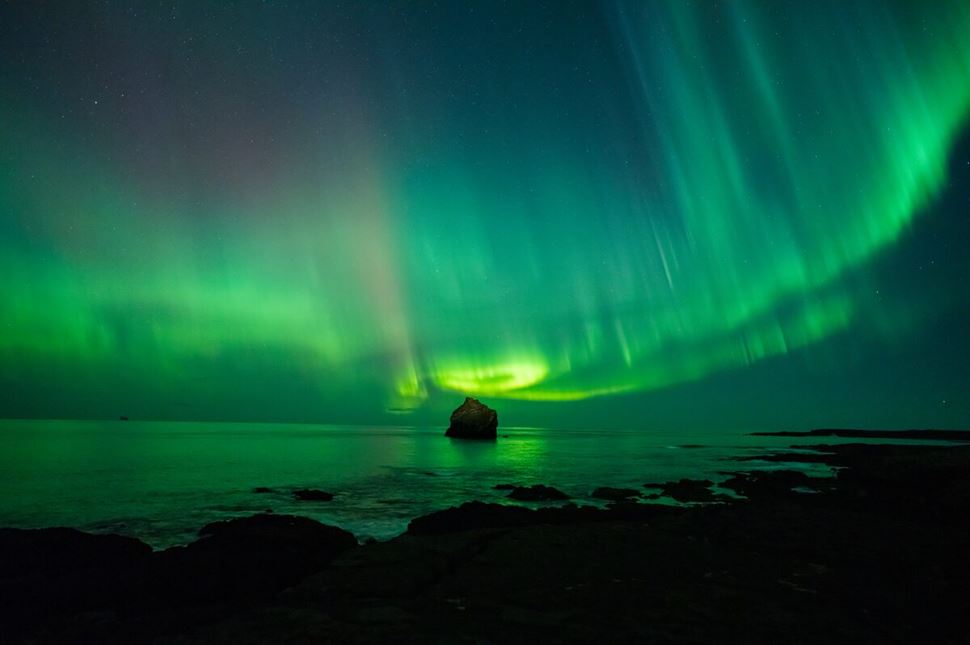
When two wonders of nature meet—Northern Lights over Reynisfjara in winter. Photographed by Gunnar Gaukur.
The unique appearance of Reynisfjara beach in different seasons draws curious travelers throughout the year. Those wanting to experience the moody beauty of the beach, visit from November to March. Reynisfjara in winter is a footprint-free snowy oasis, with roaring ocean waves tearing through the silence, which feels like you’ve reached the edge of the world. Although the weather is cold and windy, the memories are unerasable. The best way to reach Reynisfjara beach in winter is with a guided tour group, so you don’t have to worry about driving in harsh road conditions. If you stay at the nearby hotel, you can witness the Northern Lights at night.
The summer weather at Reynisfjara is characterized by long daylight hours and milder temperatures, making it ideal for hiking to the viewpoints that overlook the area. The road conditions provide easy access to the beach, making it ideal for an independent road trip or a self-driving tour. One of the most exciting Iceland summer activities you can do on Reynisfjara is watching puffins and other birds flying around the steep sea cliffs from May to September. You can also visit Halsanefshellirm cave and enjoy the ocean glow during golden hour.
Seasonal differences in Iceland make Reynisfjara unique and captivating, whether it's spring, summer, winter, or fall. Discover key activities and tips for a successful visit.
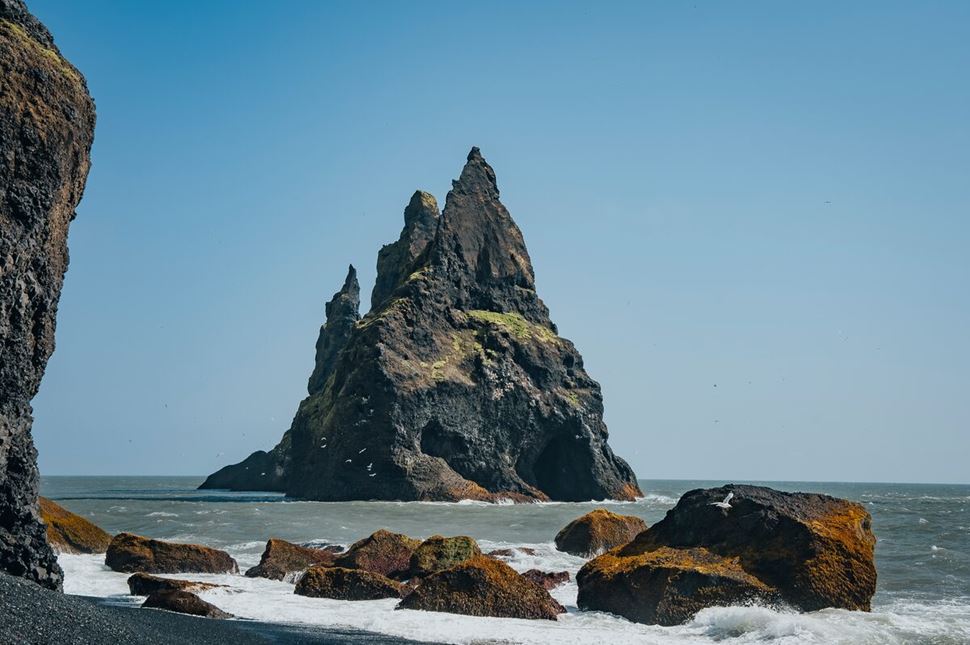
Reynisfjara’s towering sea cliffs provide a habitat for many bird species. Image: Arctic Adventures.
Reynisfjara wildlife mainly consists of various bird species. In addition to the adorable and playful Icelandic puffins, Reynisfjara birds like guillemots, kittiwakes, fulmars, arctic terns, and seagulls can be spotted in the area. The best time for birdwatching is between May and August, especially during the quiet morning or evening hours when the birds are most active. You might also spot a curious seal from time to time, though they’re more commonly seen along Iceland’s western and southwestern coasts.
Plant life at Reynisfjara is minimal because few species can thrive in the harsh volcanic environment. Some better-adapted plants you may notice include mosses, sheep sorrels, and occasional wildflowers growing on top of the basalt walls.
For a closer and more personal look at Icelandic flora and fauna, consider taking guided wildlife tours and gaining exclusive insights into the country’s native animals.
Reynisfjara parking is located within walking distance of the shoreline, just at the end of Route 215. The fee per vehicle is approximately 1,000 ISK (~ $7) and can be paid via the Parka app or at on-site payment machines.
Facilities such as public bathrooms, WiFi, and a coffee shop are available a short walk from the cave of Hálsanefshellir, at the Black Beach Restaurant.
If you're planning a multi-day trip and wondering where to stay near Reynisfjara, there are numerous options to suit various preferences. Places to stay near this black sand beach in Iceland include cozy hotels, guesthouses, and campgrounds. You can choose where to stay based on the attractions you want to visit or the season you’re traveling in. Discover unique accommodations near Reynisfjara and enjoy this serene spot a little longer.
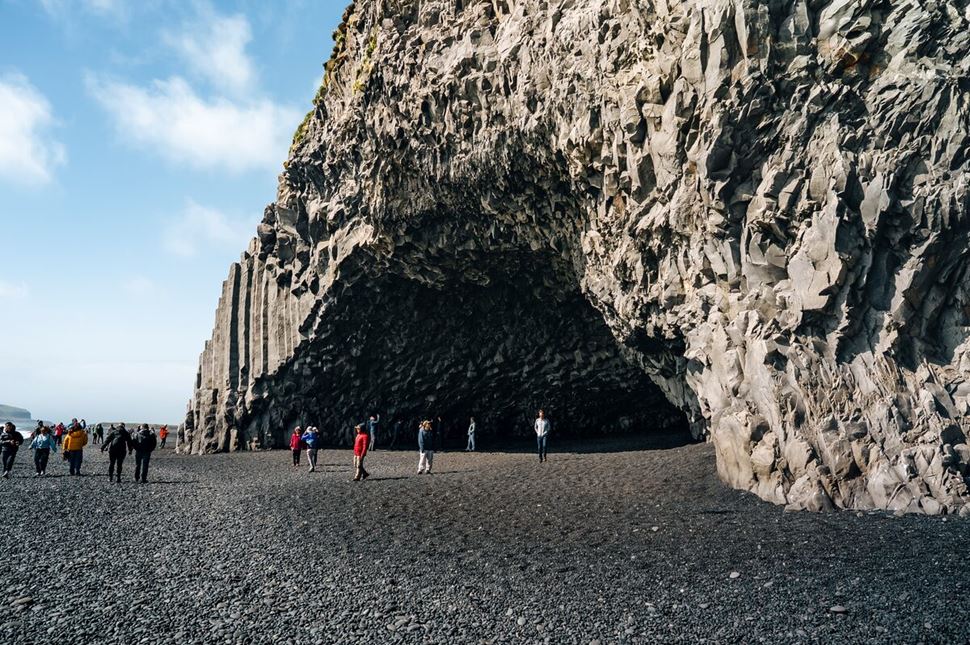
Explore the hidden beauty of Halsanefshellir cave at Reynisfjara. Photo taken by Gunnar Gaukur.
A long day of exploration can build up quite an appetite. Fortunately, finding where to eat near Reynisfjara beach is easy. There are dining options right by the beach, along with plenty of cozy cafés and restaurants in Vik. You can order starters, main courses, and desserts from traditional Icelandic to global cuisines. Discover some of the best places to eat near Reynisfjara and make your trip even more satisfying.
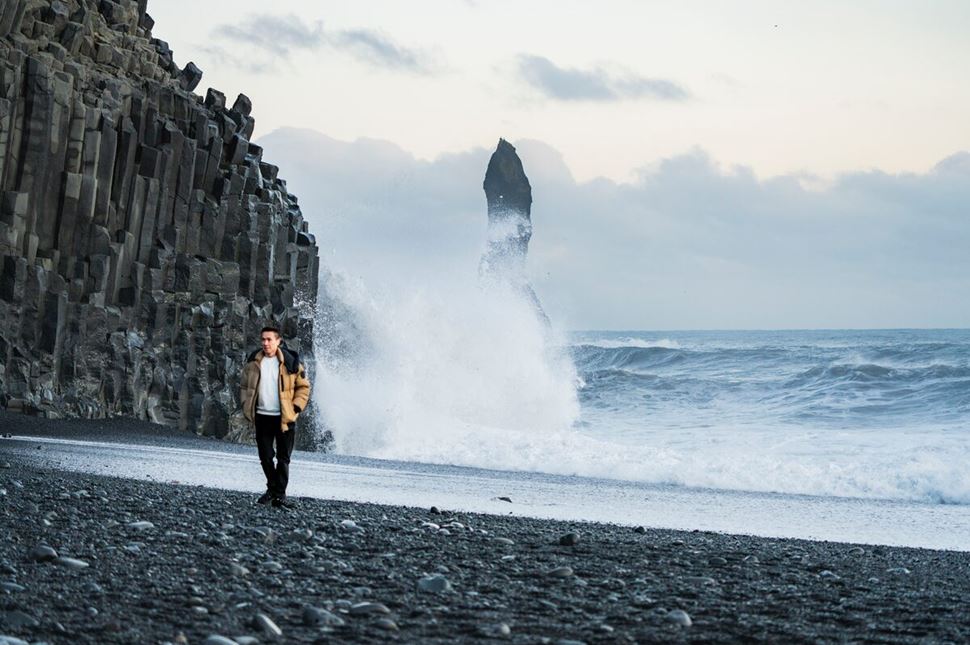
Stunning yet unpredictable, Reynisfjara’s sneaker waves demand your full attention. Photo: Arctic Adventures.
Dangers at Reynisfjara
Despite its serene beauty, Reynisfjara is one of the most dangerous beaches in Iceland because of its sneaker waves. These rapid surges are significantly larger than regular swells. They appear out of nowhere and can push much further up the shore than you expect. When they pull back, the force is even stronger, dragging everything along with them into the ocean. Reynisfjara beach surfing just isn’t an option. The best way to experience this black sand beauty is with eyes open and instincts sharp. Warning signs at the site help you identify the beach’s mood and ensure a safe visit.
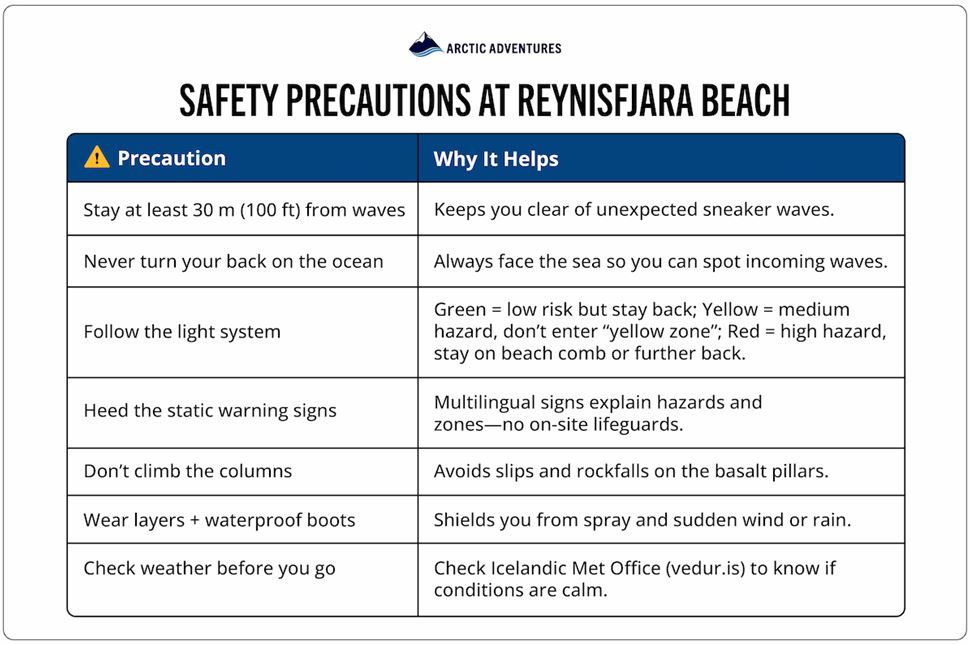
Safety tips for visiting Reynisfjara beach. Source: Arctic Adventures.
Before entering the beach, you’ll see an informational board with automatic lights indicating daily wave conditions. Pay attention to the warnings and assess the situation. If the red light is on, Reynisfjara beach is closed— you need to stay entirely off the coast. A yellow light means you can enter, but can’t cross the marked line shown on the map. A green light allows you to explore the beach freely and enter the cave, but requires you to stay alert at all times.
Discover more safety measures and helpful tips:
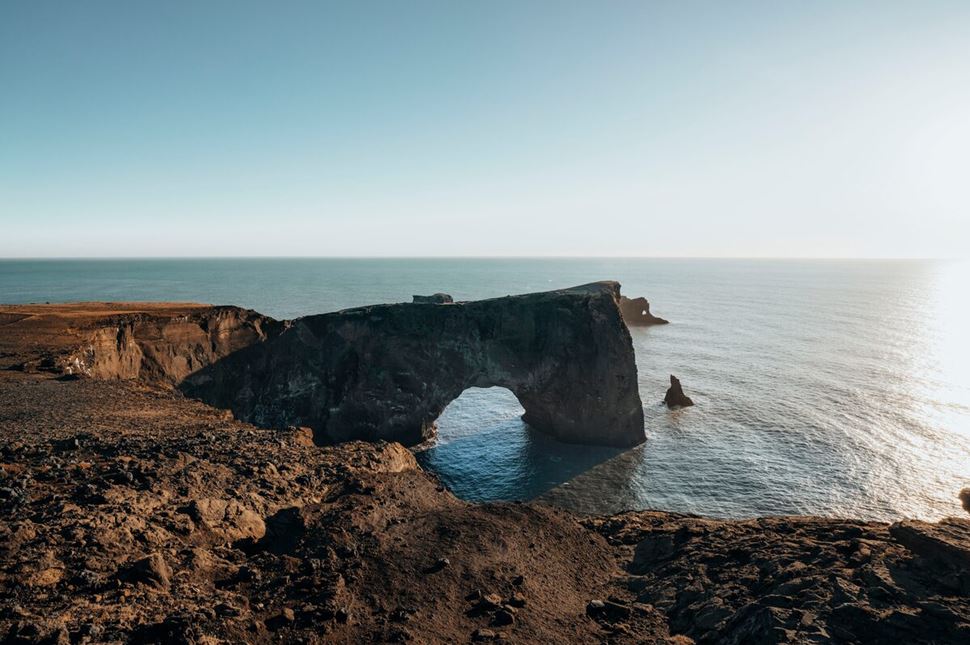
Serene sunset at Dyrhólaey arch. Thanks to Gunnar Gaukur for sharing this image.
Many nearby attractions around Reynisfjara are easily accessible and can be added to your itinerary before or after exploring the beach. Visit gems like Vik, Iceland’s southernmost village, the Dyrhólaey promontory, iconic Seljalandsfoss and Skogafoss waterfalls, and top hiking spots like Fjaðrárgljúfur canyon. Take a short detour or dedicate a whole day to new discoveries.
Vík—a scenic village by the sea. Coastal, volcanic, scenic.
As the nearest village to Reynisfjara, Vík is just a 10-minute drive from the beach. This welcoming South Coast settlement is a popular stop for travelers exploring the country. It has restaurants, shops, cafés, a variety of accommodations, and other services.
Not far from the village lies the famous Katla volcano, hidden beneath the vast Mýrdalsjökull glacier. It’s believed that if the crater were to erupt, the entire town would sink into glacial meltwater—except for its church. The red-roofed Víkurkirkja, still actively used today, stands at the heart of the village and is the symbol of the town.
Distance: Vík to beach of Reynisfjara—11 km (7 mi); Vík to Reykjavík—188 km (116 mi).
Drive time: Vík to black sand beach of Reynisfjara—13 minutes; Vík to Reykjavík—2,5 hours.
Solheimasandur—A Plane Wreck on the black sand beach. Mysterious, dramatic, photogenic.
This hidden gem is located just 20 minutes from Reynisfjara, on the vast volcanic sand area along the South Coast. To reach it, you have to walk for one hour from the parking lot or take an ATV ride.
The DC-3 airplane, which once served the US Army, had transported supplies between bases until it crash-landed in 1973. After the incident, the wreck was abandoned and, for decades, became a nesting spot for ravens and a favorite subject for local photographers capturing it in various lights and seasons.
Distance: Solheimasandur to Reynisfjara—23 km (14 mi); Solheimasandur to Reykjavik—164 km (102 mi).
Drive time: Solheimasandur to Reynisfjara—20 minutes; Solheimasandur to Reykjavik—2 hours.
Dyrhólaey—a dramatic coastal promontory. Windy, wild, iconic.
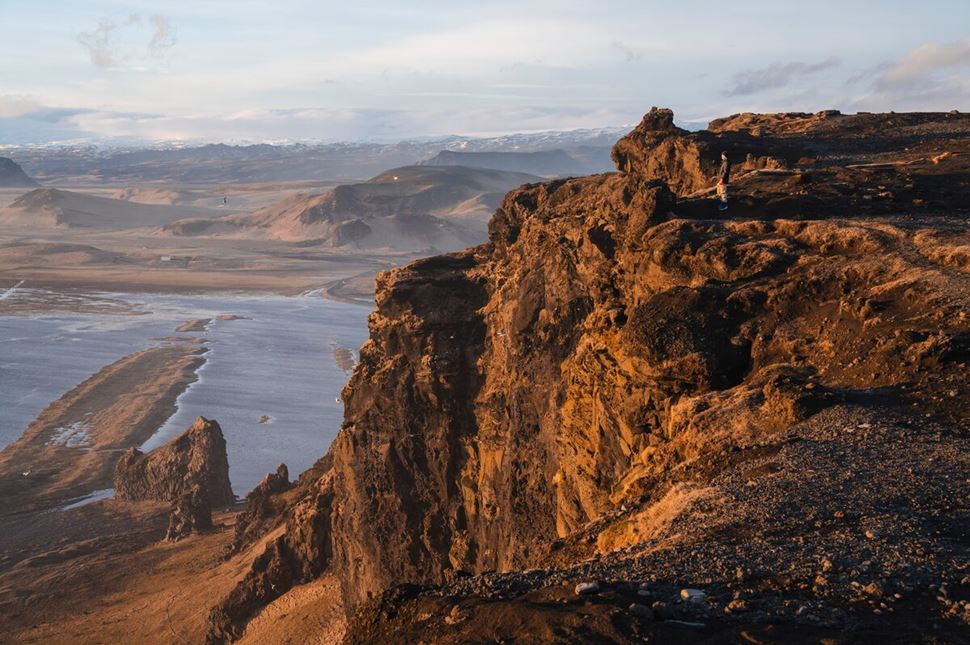
The views from Dyrhólaey Peninsula reveal rugged landscapes and snow-covered peaks. Photo: Arctic Adventures.
Dyrhólaey is a picturesque cape along the South Coast, 17 minutes from Reynisfjara. It features a dramatic arch-shaped opening in the rock, measuring 120 m (394 ft), and a beautiful white lighthouse flashing every 10 seconds.
The promontory is a vital nesting site for ducks, seagulls, arctic terns, and puffins. To protect the birds during egg-laying season, the area is open to visitors only between 9 AM and 7 PM, from May 8 to June 25.
Distance: Dyrhólaey to Reynisfjara—18 km (11 mi); Dyrhólaey to Reykjavik—178 km (111 mi).
Drive time: Dyrhólaey to Reynisfjara—17 minutes; Dyrhólaey to Reykjavik—2.5 hours.
Skógafoss—a thunderous waterfall of mist and magic. Misty, mighty, mesmerizing.
This impressive waterfall is one of the largest in Iceland, approximately 60 m (197 ft) high and 25 m (82 ft) wide. Just a 30-minute drive from Reynisfjara, it cascades from an ancient, rounded cliff, creating splashes and rainbows.
With its striking scenery, the falls have served as a backdrop for films such as Thor: The Dark World and The Secret Life of Walter Mitty. In summer, it’s a favorite spot for hikers.
Distance: Skógafoss to Reynisfjara—34 km (21 mi); Skógafoss to Reykjavik—156 km (97 mi).
Drive time: Skógafoss to Reynisfjara—30 minutes; Skógafoss to Reykjavik—2 hours.
Seljalandsfoss—the refreshing waterfall with a hidden path. Majestic, immersive, memorable.
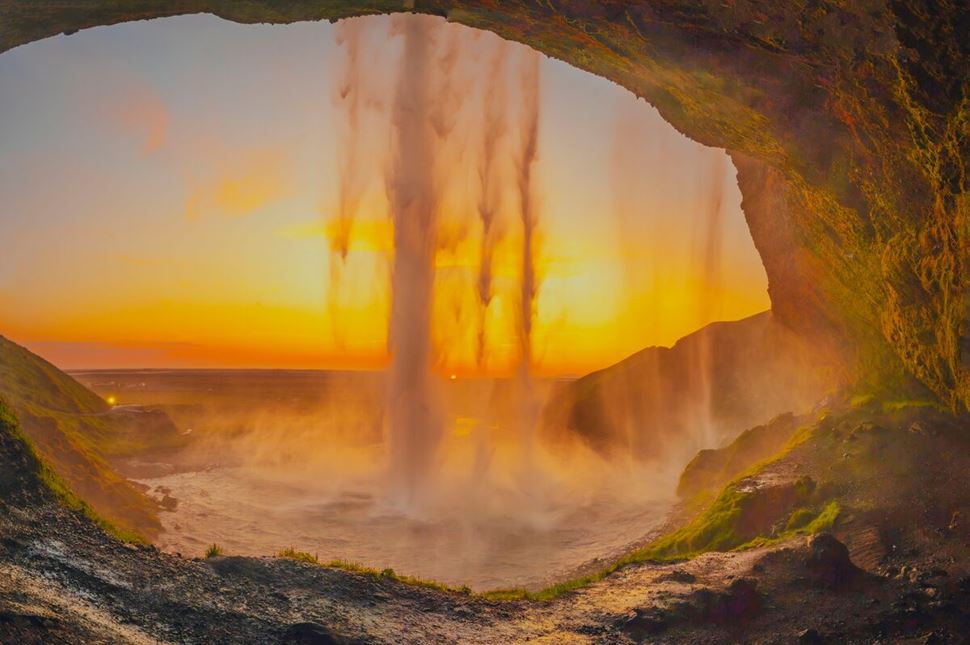
Follow the path at Seljalandsfoss to walk right behind its majestic cascade. Captured by Gunnar Gaukur.
The picturesque Seljalandsfoss falls are renowned for the scenic path that leads behind the cascade. In summer, you can easily access the trail and walk 360° around the waterfall. As you enter the shallow chamber, prepare to be splashed thoroughly, as the mighty cascade creates a misty spray. The photos are absolutely worth it!
Seljalandsfoss is located about an hour from Reynisfjara. You can get there by renting a car or joining a guided South Coast tour.
Distance: Seljalandsfoss to Reynisfjara—62 km (39 mi); Seljalandsfoss to Reykjavik—128 km (80 mi).
Drive time: Seljalandsfoss to Reynisfjara—50 minutes; Seljalandsfoss to Reykjavik—2 hours.
Fjaðrárgljúfur—a serpentine canyon carved by time. Breathtaking, ancient, surreal.
Located one hour away from Reynisfjara, Fjaðrárgljúfur canyon is one of the most pristine hiking locations in the country. Its moss-covered cliffs create a fairytale-like atmosphere, with several trails offering experiences suitable for travelers of varying fitness levels. You can take a 2 km (1.24 mi) long hike along the gorge or stroll from the parking lot to the viewing platform overlooking a serene waterfall.
Distance: Fjaðrárgljúfur to Reynisfjara—79 km (49 mi); Fjaðrárgljúfur to Reykjavik—255 km (158 mi).
Drive time: Fjaðrárgljúfur to Reynisfjara—1 hour; Fjaðrárgljúfur to Reykjavik—3.5 hours.
Katla—an active, towering volcano beneath the ice. Powerful, legendary, and has an iconic ice cave.
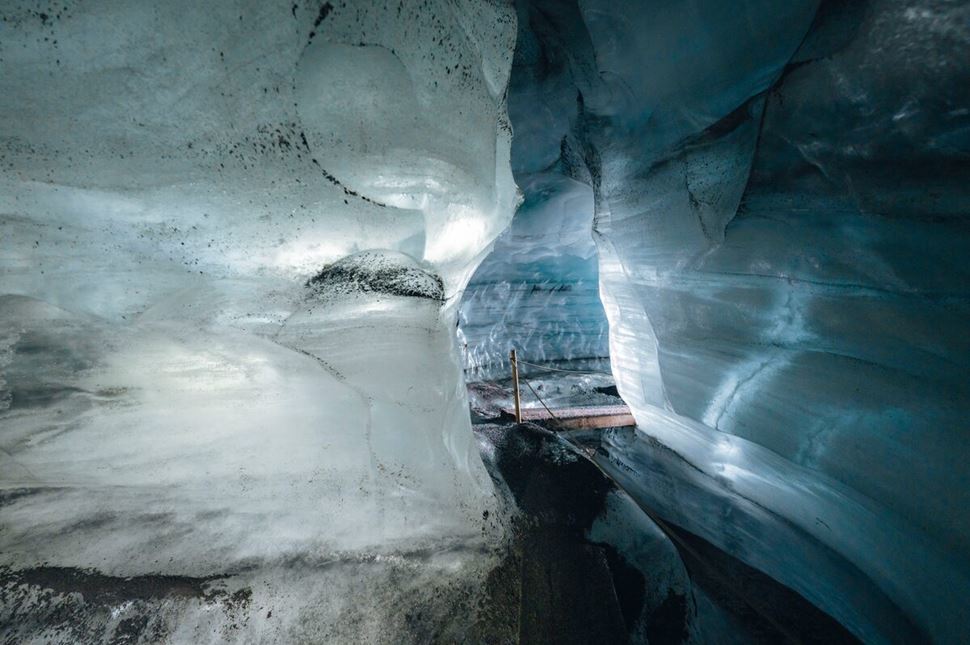
A surreal world of ice inside the Katla cave. Image: Arctic Adventures.
This active stratovolcano is nestled under the Mýrdalsjökull glacier, about 40 minutes from the beach. Between 930 and 1918, there were 16 to 20 recorded eruptions, with the most recent occurring in 1918. The name, Katla, means “kettle”—a fitting choice for such a beast bubbling just beneath the surface.
While the volcano itself cannot be accessed due to its high activity, you can explore the Mýrdalsjökull ice cap and its most popular cave, Katla. You may join the ice caving tour from Vik or Reykjavik.
Distance: Katla to Reynisfjara—27 km (17 mi); Katla to Reykjavik—187 km(116 mi).
Drive time: Katla to Reynisfjara—40 minutes; Katla to Reykjavik—3 hours.
The dramatic black sand beach at Reynisfjara is, without a doubt, one of the must-visit beaches in Iceland. Its towering basalt columns, coal-black shores, and thunderous waves make it a once-in-a-lifetime experience—and a true masterpiece of nature. Despite its serene beauty, this coastal oasis demands extra caution due to powerful sneaker waves that can appear without warning. Always follow safety guidelines and never turn your back to the ocean.
Visit Reynisfjara Beach—home to puffins in summer and the swirling Northern Lights in winter—and explore the stunning attractions nearby.
Yes, Reynisfjara is worth your time, as it is the most popular black sand beach in Iceland. Its mysterious atmosphere and dramatic appearance feel like a movie scene you want to rewatch again and again. There’s plenty to do here, from exploring basalt formations and caves to spotting puffins along the cliffs in summer.
You’ll need about an hour to experience Reynisfjara Beach. Take your time to soak in the scenery, walk on the black sand, and step into the basalt cave of Hálsanefshellir. If you’d like to enjoy the surroundings a little longer, stop for lunch at the nearby Black Beach Restaurant. After that, you can take the Reynisfjall hike to the western viewpoint for stunning vistas of the Reynisdrangar sea stacks.
Reynisfjara’s sand is black because it is composed of tiny lava rocks that have eroded over time. Just like other dark sand beaches, such as the ink-hued Diamond Beach, the unique color of the sand is related to the high volcanic activity.
Reynisfjara was formed thousands of years ago. The black sand resulted from the erosion of hardened lava rocks. Over time, crashing waves sculpted the beach’s striking basalt columns and dramatic cliffs that we see today.
No, swimming in Reynisfjara is prohibited and dangerous due to strong currents and unpredictable, powerful waves. Be aware of the warning signs at the beach and keep at least 30 m (100 ft) away from the water.
The most popular activities at the black sand beaches, such as Reynsfjara, include exploring the basalt columns and admiring the sea stacks offshore. When conditions are calm, you can step inside the cave of Hálsanefshellir. In summer, puffins often fly above the cliffs, while in winter, you can stay at a nearby hotel and look for the Northern Lights.